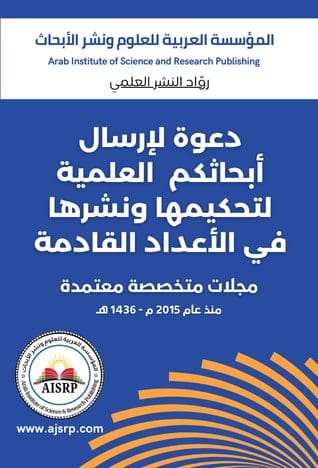Effectiveness of Using Praise as an Intervention to Improve On- task Behavior of Preschoolers with Attention- Deficit/Hyperactivity Disorder (ADHD)
Abstract:
This study aimed to examine the effectiveness of using praise as an intervention to improve on- task behavior of preschoolers with Attention Deficit- Hyperactivity/Disorder (ADHD) . Participants of the study were five children (3 males and 2 females) ; two of them diagnosed with ADHD, and three of them were identified by their teachers as at risk of having ADHD. All participants were enrolled in a regular class at King Saud University kindergarten in Riyadh. The study was conducted in classroom setting the setting is a teacher- directed activity in which the teacher teach children some tasks.
Two designs of Single Subject Designs (SSD) used in this study. The designs used are: A- B- A- B Withdrawal Design, and Multiple Baseline Designs across Participants. The researcher provide teachers with a workshop on praise strategy. Then she asked them to use the strategy, and assist them with children praise when needed. Data were collected by the researcher and two researcher assistants using direct observation. Behaviors were observed in the teacher- directed activity setting throughout several phases: baseline, implementation of the intervention, withdrawal of the intervention, reimplementation of the intervention, and follow- up; while in the open activity setting behaviors were observed in two phases: baseline and implementation of the intervention.
Results of the study showed that there is a positive functional relationship between using praise and on- task behavior of preschoolers with ADHD.
Keywords:praise, On- task Behavior, Attention- Deficit/Hyperactivity Disorder, Preschools.
الملخص
وتم استخدام تصميمين من تصاميم الحالة الواحدة (Single Subject Designs) وهي: تصميم السحب أ- ب- أ- ب (A- B- A- B Withdrawal Design) وتصميم الخطوط القاعدية عبر الأفراد (Multiple Baseline Designs across Participants) . وقدمت الباحثة ورشة تدريبية للمعلمات حول استراتيجية الثناء، ثم طلبت منهن استخدام الاستراتيجية وحرصت على مساعدتهن عندما يكن بحاجة لذلك عند تقديم الثناء للأطفال. وقامت الباحثة مع مساعدتي باحث بجمع البيانات من خلال الملاحظة المباشرة. وتمت ملاحظة السلوكيات في فترة التعليم الموجة خلال عدة مراحل، هي: مرحلة الخط القاعدي، مرحلة التدخل، مرحلة سحب التدخل، مرحلة إعادة التدخل، مرحلة المتابعة، أما في فترة الأركان فقد تمت ملاحظة السلوك خلال مرحلتين هما: مرحلة الخط القاعدي، ومرحلة التدخل.
وقد أظهرت نتائج الدراسة أن هناك علاقة وظيفية إيجابية بين استخدام الثناء وسلوك إتمام المهمة لدى الأطفال الذين لديهم اضطراب الانتباه والنشاط الزائد.
الكلمات المفتاحية: الثناء، إتمام المهمة، اضطراب الانتباه والنشاط الزائد، رياض الأطفال.
الباحثة /
ندى عبد الرحمن الحزيمي
قسم التربية الخاصة || كلية التربية || جامعة الملك سعود || المملكة العربية السعودية
DOI: 10.26389/AJSRP.N290418 عرض البحث كامل عرض العدد كامل



